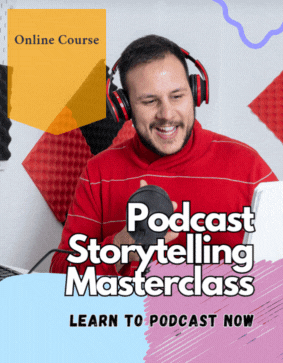Why You Should be Creating Podcast Clips #podcasting #videopodcast #podcastclips
995 View
Share this Video
- Publish Date:
- May 18, 2025
- Category:
- Podcasting
- Video License
- Standard License
- Imported From:
- Youtube
Tags
-----------------------------------------
Realtor Podcast Marketing for Real Estate Agents Success
🏡 Want to stay top-of-mind with potential buyers and sellers—even when you're off the clock? Realtor Podcast Marketing for Real Estate Agents Success is your roadmap to creating a podcast that keeps working for you 24/7. Imagine having the undivided attention of your ideal clients every week, right in their earbuds, building trust and positioning you as their go-to Realtor—no matter when they’re ready to make a move.
This class walks you step-by-step through setting up your own real estate podcast, even if you’ve never recorded before. You'll learn how to use this powerful marketing tool to reach your farm area, stay connected with past leads, and establish a personal presence that traditional marketing just can't match.
👉 Click here to join the online course now and start building a real estate brand that speaks directly to your audience—anytime, anywhere.
2 Must-Know Podcasting Tips for Your Show
Utilizing SEO Strategies for Podcast Visibility

Implementing SEO strategies can enhance your podcast’s visibility on search engines and podcast directories. Start by conducting keyword research to identify terms your target audience is searching for. Incorporate these keywords naturally into your podcast titles, descriptions, and show notes. Optimize episode titles to be both descriptive and keyword-rich, improving discoverability. Transcribe your episodes to provide text content that search engines can index, boosting your SEO efforts. Additionally, use relevant tags and categories when submitting your podcast to directories. By leveraging SEO, you increase the likelihood of your podcast being found by new listeners actively seeking content in your niche.
Developing a Unique Voice and Style

Establishing a unique voice and style sets your podcast apart and makes it memorable to listeners. Define your podcast’s personality by determining the tone, whether it’s conversational, formal, humorous, or inspiring. Be authentic in your delivery, allowing your genuine personality to shine through and connect with your audience. Develop consistent formatting, including how you introduce topics, transition between segments, and sign off each episode. Incorporate distinctive elements such as catchphrases, specific storytelling techniques, or unique soundscapes that reflect your podcast’s identity. A strong and consistent voice fosters recognition and loyalty, encouraging listeners to return and recommend your podcast to others.
Frequently Asked Questions
What role do podcast covers and branding play?
Visual elements like podcast covers and branding are crucial for making a strong first impression, attracting potential listeners, and conveying the essence of your show effectively.
What are effective ways to promote my podcast?
Utilize social media, collaborate with other podcasters, submit your show to podcast directories, and engage with your audience through newsletters or community forums to expand your reach.
How often should I release new podcast episodes?
Consistency is key. Whether weekly, bi-weekly, or monthly, establish a schedule that you can maintain to keep your audience engaged and coming back for more.
How do I choose the right microphone for my podcast?
Select a microphone based on your budget and recording environment. USB microphones are user-friendly for beginners, while XLR microphones offer higher sound quality for more professional setups.
How can I collaborate with other podcasters?
Partner on joint episodes, guest on each other's shows, share resources, and promote each other's content. Collaboration expands your network and introduces your podcast to new audiences.
Statistics
- Investing time in marketing can increase a podcast’s audience by up to 50% annually.
- About 55% of podcasters use interviews as a key strategy to provide diverse content.
- Effective use of keywords in podcast descriptions can improve search rankings by 30%.
- Approximately 70% of successful podcasters invest in high-quality microphones to ensure clear audio.
- Approximately 65% of podcasters monetize their shows through sponsorships and advertising.
- On average, podcasters spend about 10 hours per episode from planning to publishing.
- About 60% of podcasters find that offering premium content subscriptions generates additional revenue.
- Podcasts with consistent weekly releases are 60% more likely to grow their audience steadily.
- Podcasts with eye-catching cover art are 45% more likely to attract new listeners.
- Podcasts utilizing video snippets on social media experience a 20% rise in audience interaction.
- About 50% of podcast listeners prefer shows that offer a mix of solo and interview episodes.
- Listeners prefer podcast episodes that range between 30 to 45 minutes, with 65% favoring this duration.
- Podcasts that utilize analytics to refine content strategies experience a 40% improvement in listener satisfaction.
- Collaborating with other podcasters can lead to a 20% growth in listener base.
- Over 80% of podcasters report that having a dedicated website enhances their show’s visibility.
- Genres such as true crime, technology, and personal development are among the most popular, attracting over 70% of listeners.
External Links
radiopublic.com
audacityteam.org
listennotes.com
thepodcasthost.com
optimizingpodcasting.com
zoom.us
podcastcareers.com
inc.com
podcastgrandcentral.com
anchor.fm
podcastpage.io
blog.podomatic.com
mailchimp.com
podcasters.spotify.com
canva.com
help.apple.com
podcastitalia.com
How To
How To Create a Podcast Launch Checklist
Creating a podcast launch checklist ensures that all necessary tasks are completed for a successful start. Begin by defining your podcast’s concept, including the niche, target audience, and episode format. Develop your branding elements, such as the podcast name, logo, and cover art, ensuring they reflect your show’s theme. Set up your recording equipment and software, conducting test recordings to verify audio quality. Plan and record several episodes in advance to provide a buffer and maintain consistency. Choose a reliable podcast hosting service and submit your podcast to major directories like Apple Podcasts and Spotify. Create a promotional strategy, including social media campaigns, email newsletters, and collaborations with other podcasters. Finally, launch your podcast with an initial set of episodes and actively promote it to generate interest and attract listeners from the outset.















